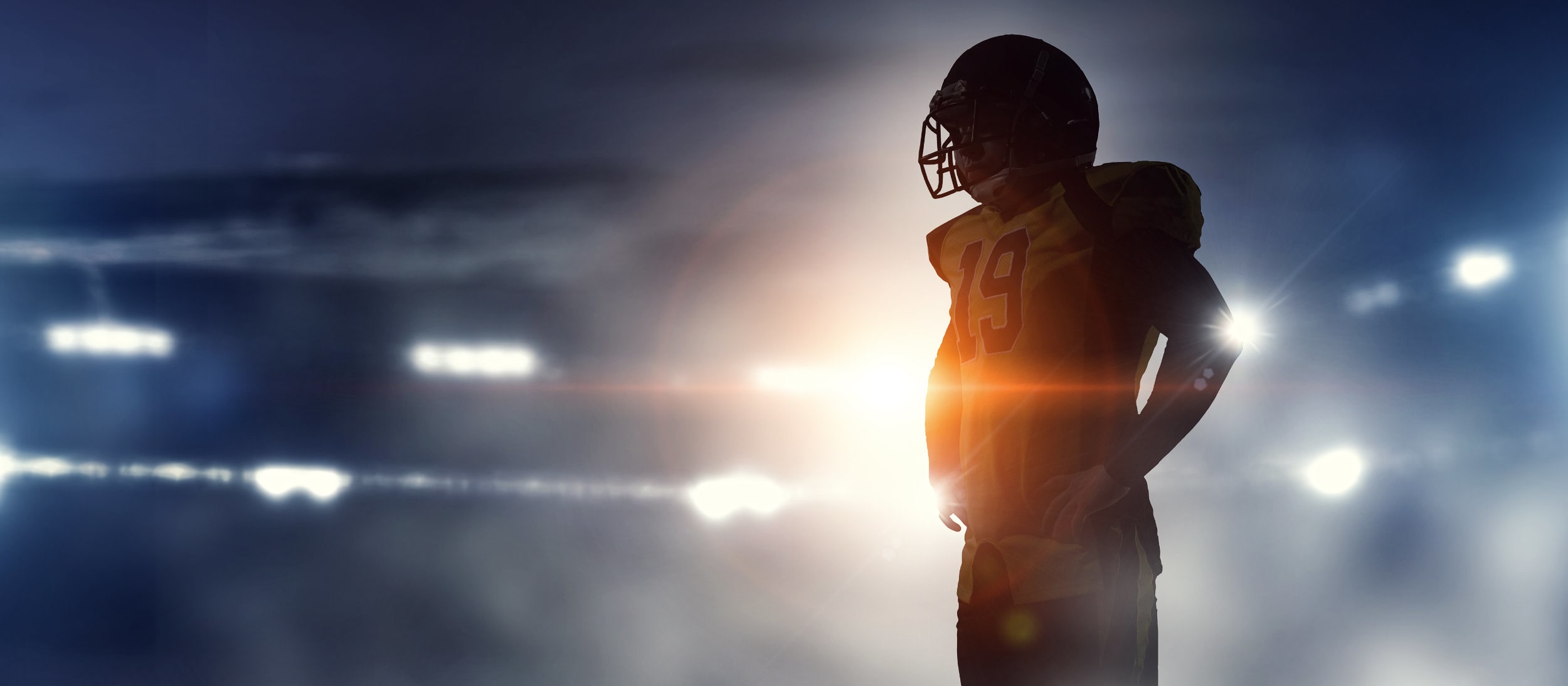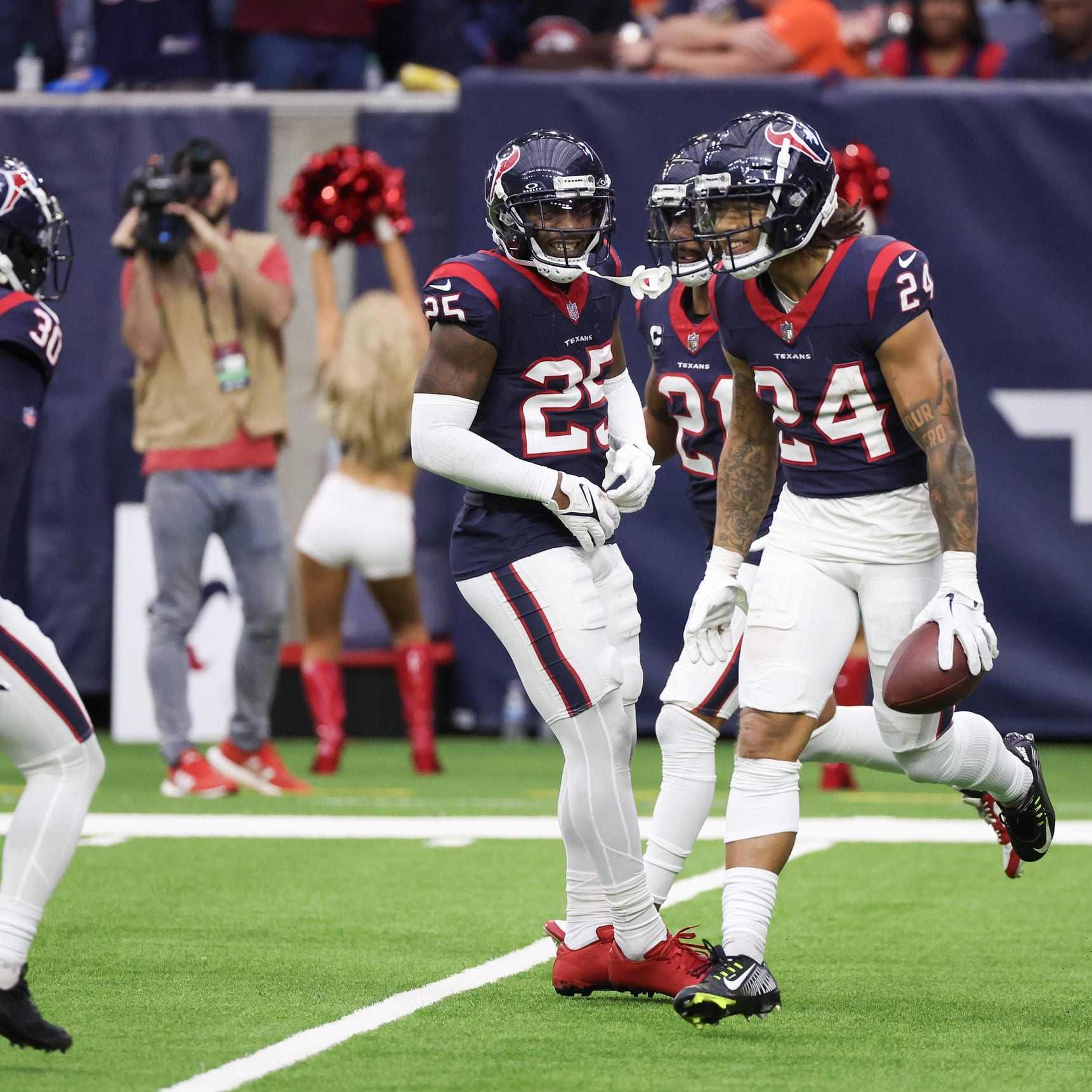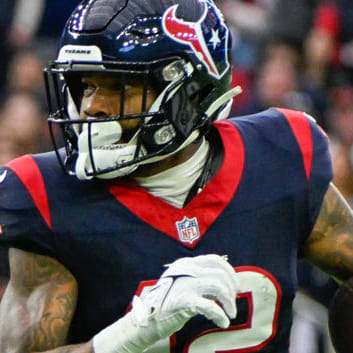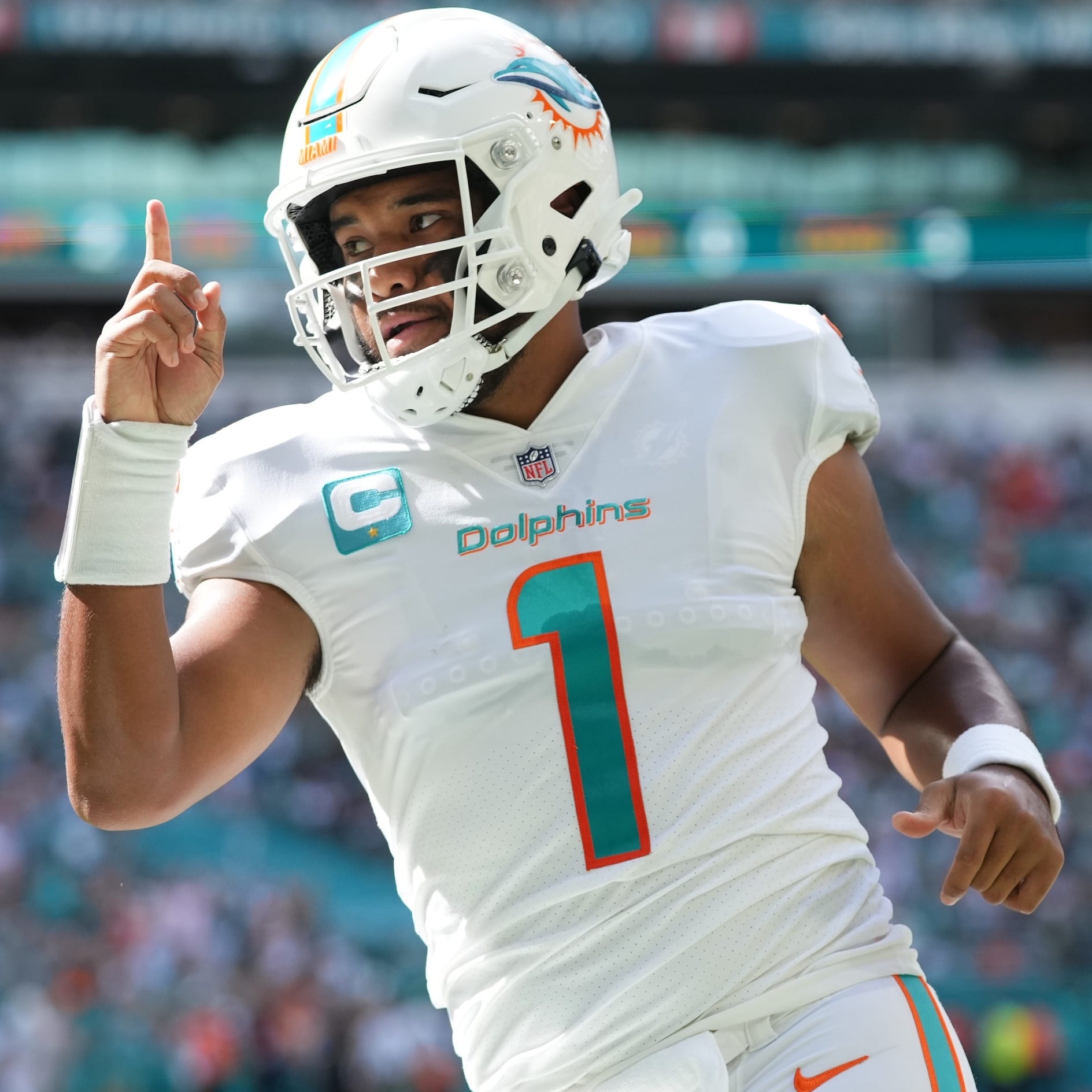This article is part of our East Coast Offense series.
Revisiting Pick 1.6
In Week 2, I wrote about how I already regretted taking Chris Johnson at 1.6 in two NFFC leagues. And while it was nice to see him go off for 195 yards and two TDs Sunday, he's still on pace for just 1,385 yards from scrimmage and 4.6 scores, hardly first – or even second – round material.
But the player I felt I should have taken – as the big five (Arian Foster, Ray Rice, LeSean McCoy, Calvin Johnson and Aaron Rodgers were gone) and I didn't want to spend an early pick on a QB – was Darren McFadden, who's on pace for 1,309 yards from scrimmage and 5.3 scores. In other words, he's been about exactly equal to Johnson. Other running backs I could have taken there – DeMarco Murray, Matt Forte, Trent Richardson and Maurice Jones-Drew – haven't fared much better and in some cases would have been quite a bit worse. Marshawn Lynch, Adrian Peterson and Jamaal Charles were probably the best bets from the second tier, but I can't recall anyone taking them at 1.6.
My No. 2 WR was A.J. Green who would have made a fine pick there, but I got him in the second round in one of those leagues anyway. And neither of the top two tight ends – Jimmy Graham and Rob Gronkowski – has lived up to his late-first/early-second round draft slot, let alone No. 6 overall.
Revisiting Pick 1.6
In Week 2, I wrote about how I already regretted taking Chris Johnson at 1.6 in two NFFC leagues. And while it was nice to see him go off for 195 yards and two TDs Sunday, he's still on pace for just 1,385 yards from scrimmage and 4.6 scores, hardly first – or even second – round material.
But the player I felt I should have taken – as the big five (Arian Foster, Ray Rice, LeSean McCoy, Calvin Johnson and Aaron Rodgers were gone) and I didn't want to spend an early pick on a QB – was Darren McFadden, who's on pace for 1,309 yards from scrimmage and 5.3 scores. In other words, he's been about exactly equal to Johnson. Other running backs I could have taken there – DeMarco Murray, Matt Forte, Trent Richardson and Maurice Jones-Drew – haven't fared much better and in some cases would have been quite a bit worse. Marshawn Lynch, Adrian Peterson and Jamaal Charles were probably the best bets from the second tier, but I can't recall anyone taking them at 1.6.
My No. 2 WR was A.J. Green who would have made a fine pick there, but I got him in the second round in one of those leagues anyway. And neither of the top two tight ends – Jimmy Graham and Rob Gronkowski – has lived up to his late-first/early-second round draft slot, let alone No. 6 overall. My No. 2 QB, Tom Brady, has been similarly pedestrian.
In the end, while waiting on quarterbacks might have been the right strategy generally – considering how late one could get Robert Griffin, III, Andrew Luck and Andy Dalton – the right pick at 1.6 was Drew Brees.
So Much for the Depth at Tight End
Heading into the season, the question was whether to spend a late-first or early-second round pick on the historically good Graham or Gronkowski, use a fourth or fifth rounder on the next tier – Antonio Gates and Aaron Hernandez – or pass on all of them given the extraordinary depth at the position. It turns out – much like drafting at 1.6 – there weren't a lot of good options.
If you sprung for any of the top four, you can't be happy, though Gronkowski at least is on a pace for 1,000 yards and 11 scores, which you can live with in Round 2, especially given how badly Graham, Hernandez, Gates, Vernon Davis, Jermichael Finley and Fred Davis have been. If you waited and took Brandon Pettigrew, Greg Olsen, Jermaine Gresham or Jason Witten, you got very little from the position, but at least you wasted a mid-to-late round pick. The only significant sources of profit are Tony Gonzalez, Owen Daniels and Heath Miller. I suppose you could count Kyle Rudolph in TD-heavy leagues, too.
Particles and Waves
I wrote about this four years ago, but the analogy occurred to me a little differently this time. While matter can be viewed as static (particles) or dynamic (waves), so can NFL teams and players. We can take a particle-like view – "Shonn Greene's a plodder", "Chris Johnson has lost a step" – or we view them more as waves whose skill sets fluctuate, based not only on health and role, but also on system, play-calling, game-situation and team context.
I wrote as much four years ago, but it occurred to me not all waves are of equal size or duration. Drew Bennett had a monster three-game stretch – 28-517-8 – in 2004 and then failed to eclipse 100 yards in any game in 2005. The wave was huge, but it didn't last very long. When the Patriots upset the Rams in Super Bowl XXXVI, it seemed to many like a fluke. But that wave – the Patriots being an elite team – still has not broken yet.
When you consider that player and team success range from a few-game stretch where a doormat gives contenders a hard time before returning from whence it came to a decade-long dynasty, it seems prudent to evaluate team (and player) strength based on a variable rather than fixed sample of games. Put differently, if we want to know how good the Giants defense is, do we evaluate its performance since Week 1 when they were missing Prince Amukamara, Jayron Hosley (and Michael Coe) and were forced to use special teamer Justin Tryon in coverage? Or do we start in Week 3, or Week 4? If you've evaluating Jordy Nelson going forward, do we average his production from the start of the season or just the last few games since the Packers offensive line has played better?
These aren't easy questions to answer. If we arbitrarily choose our end points on a case-by-case basis, we can make Bennett seem like the greatest receiver of all time. So it's probably safer just to pick the duration of games that on average seems to be most predictive of performance going forward. But whenever you use an average, you risk including some bad data that no longer applies to the present circumstances. The rule should probably be something like: Use the last 10 games with the most recent 3-5 getting more weight unless something significant has changed in which case you customize your sample size. The problem then becomes identifying what's a significant change and what isn't, i.e, when to customize and when to use the average. But solving that isn't necessarily any easier than the problem of evaluating a team or player in the first place.
Things to Take Away from Week 7
•Robert Griffin III converted a ridiculous 4th-and-10 play with the game on the line while spinning and changing directions to avoid Jason Pierre-Paul and Justin Tuck. Griffin is exceeding the substantial hype preceding his arrival into the league, and if I were to pick a QB to run my real-life franchise for this year only, I'd already take him ahead of Matt Ryan, Matthew Stafford, Joe Flacco and maybe Tony Romo and Philip Rivers. In fantasy, I think only Drew Brees and Aaron Rodgers can be safely ranked ahead of him. Consider also that RGIII has missed his top receiver Pierre Garcon for most of the year and his No. 2 target Fred Davis for some of it (and now the rest of it).
•Victor Cruz is the rare top-five real life NFL receiver who doesn't have elite size or speed. What he does have is decent size, good speed, elite quickness and great hands. He's a bigger, faster just as shifty version of Wes Welker.
•Eli Manning had a subpar game, throwing two picks and missing some wide open targets. But he made the big throw when it counted, and no one ever worries about him anymore.
• It wasn't surprising Trent Richardson couldn't seriously play with damaged rib cartilage – it sounded fishy the entire week. But even the ostensibly healthy Montario Hardesty got just seven carries for 28 yards against a Colts defense that plodding Shonn Greene shredded last week. Or so we thought that was the takeway. But maybe it wasn't merely that the Colts defense was bad, but that the Jets offensive line is starting to play better. Greene ran for just 54 yards on 16 carries against a stout New England front, but he looked nimble on a few runs and also caught six passes for 34 yards, while the offense moved the ball consistently.
•Mark Sanchez played well Sunday, getting eight yards per attempt and leading the Jets comeback. Were it not for a terrible Stephen Hill drop, the Jets might even have won the game. Still, Hill showed the ability to get open, and Jeremy Kerley and Dustin Keller were also significantly involved. It doesn't seem like Santonio Holmes will be particularly missed.
• You don't often see the Ravens on the wrong side of blowouts like this. The Texans made the Green Bay loss seem like an anomaly, though another reading is that maybe the Packers are just that good – after all, they essentially blew out the Rams in St. Louis, too, and no one had beaten up the Rams except the Bears in Chicago on a fourth quarter pick six. The 30-20 score was actually due to the Rams getting points in garbage time.
• The Seahawks dominated the 49ers in the first half Thursday night and would have had a significant lead but for some terrible dropped passes. Russell Wilson has a cannon even when throwing on the move, something that reminds one of Michael Vick, though Wilson trades some foot speed for accuracy. The 49ers took over in the second half, mostly behind Frank Gore who looked like he was in his prime against one of the league's top run defenses. Of course, he hurt his ribs in the fourth quarter, but has 10 days to get ready for Week 8.
• One of the greatest moments in gambling history occurred at the end of that game, and even though I had the 49ers and lost when Jim Harbaugh declined the holding penalty (and hence the safety), no one can take away the 30 seconds of elation between the flag and seeing it declined. It was miracle, albeit a temporary one.
• The Vikings won even though Christian Ponder passed for 58 yards and threw two picks.
•Josh Freeman had a huge fantasy day, but the guy seems like he's moving in slow motion, whether it's taking an hour to survey the field or taking an eon to line up and run a play with the clock winding down. And Greg Schiano is so old school it seems like he's adapted his playbook from stone age cave scrawlings. "Smash rock into end zone." Finally after wasting three goal-to-go plays from the one, the Bucs had Freeman roll out at 3 mph. It was like watching Philip Rivers run the ball if Rivers were straining to stay continent.
• With Jimmy Graham out, Lance Moore looked like Victor Cruz, getting open at will and plucking nine of 10 targets out of the air for 121 yards.
• The only thing keeping the Bucs in the game was the Saints playing "allow" defense, a variation of "prevent" where you take away no part of the field because you can always shove a receiver out of bounds who will be penalized if he catches the ball.
Things to Look for in Week 8
• The undefeated Falcons take their smoke and mirrors act to Philadelphia.
• The Giants head to Dallas with a 1.5 game lead in the NFC East.
• The Saints take their offense-only game to Denver in a reprise of the Super Bowl 44 quarterback matchup.
Beating the Book
Falcons +1.5 at Eagles
The Eagles are a frustrating team with all the turnovers and bad clock management, but Andy Reid is 13-0 in his career off a bye week, and the Falcons are not nearly as good as their 6-0 record, having barely beaten the Raiders and Panthers at home in recent weeks. Back the Eagles who roll.
Eagles 34 – 16
Last week we lost with the Bills to put us at 3-4 on the season in this forum and 50-51-3 overall. Last year we went 10-7 in this forum and 124-125 overall. Over the last five years we've gone 50-34 in this space. You can read the full Week 6 column here.
Surviving Week 8
Last week, I wound up taking the Vikings (indecisiveness kept me away from the Niners on Thursday night and a sense that more people would be on the Patriots than the early polling showed kept me off the Pats), but nearly everyone made it through. Let's take a look at this week's slate:
| Team | Opponent | %Taken | Vegas ML** | Vegas Odds |
| PACKERS | Jaguars | 62.60% | 900 | 90.00 |
| BEARS | Panthers | 12.00% | 320 | 76.19 |
| VIKINGS | Buccaneers | 9.40% | 260 | 72.22 |
| Patriots | RAMS | 4.30% | 275 | 73.33 |
| Chargers | BROWNS | 2.20% | 135 | 57.45 |
| BRONCOS | Saints | 1.90% | 245 | 71.01 |
| 49ers | CARDINALS | 1.70% | 270 | 72.97 |
| TITANS | Colts | 1.50% | 175 | 63.64 |
| JETS | Dolphins | 1.20% | 125 | 55.56 |
| STEELERS | Redskins | 1.20% | 225 | 69.23 |
* according to OfficeFootballPools.com
** average of the two moneylines
First off, there was no moneyline available for Green Bay-Jacksonville, so I made it up. Ninety percent is pretty aggressive, but in this case it's conservative because you want to make the case against the Packers given their 63-percent popularity while giving them their strongest possible chance to win. Moreover, with the Jaguars down to their second-string QB and missing arguably their best player in Maurice Jones-Drew, 90 percent might be accurate.
Let's assume our standard 100-person pool with a $10 entry fee. If you take the Bears, they win and Green Bay loses, then there are only 37 people left. Your pool equity goes from $10 to $27. If you take the Packers and Chicago loses, your equity goes from $10 to $11.36. 27/11.36 equals 2.38. In other words, the payout with Chicago is 2.38 times as good as the payout from taking Green Bay.
But the Packers have only a 10 percent chance to lose, while the Bears have a 23.81 percent chance to lose. That's 2.38 times as much.
What does that mean? It means if you accept these numbers, we have a tie. You can either play it safe and get a safe return, or take a risk and a chance for a bigger return. But in terms of expected equity, both teams offer the same amount.
All things being equal, I'm inclined to play it safe, as I believe I have an edge most weeks, so there's no reason to put all my chips in for even money.
Of course, I reserve the right to change my mind when the full article comes out Wednesday night.
Follow Chris on Twitter at @Chris_Liss










